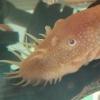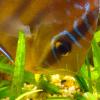Awesome info Hooked! I'm a relative beginner at Discus, but very happy with what I've achieved in quite a short time. For what it's worth, I can also share my short but interesting journey...
I have a 4ft 180l community planted tank in which the centrepiece is a bonded pair of Discus (female wild Red Cuipeua and male Blue Diamond). I allowed the tank to mature for a few months before adding the Discus, as I wanted practice regarding water parameters, and to establish the planted ecosystem and base community of fish. Other residents in the tank include Cardinal/Red Phantom tetras, hatchetfish, and at various times Apistogrammas and Royal Whiptail Catfish. I also have native shrimp in there as a cleanup crew, but the discus don't consider them as food so they are safe.  I really think a planted tank with driftwood etc is the best environment for Amazonian fish... they have places to hide, define territory, and even play. Even though I only have a pair of discus, they are very happy and not at all shy, constantly parading around the tank and only hiding when particularly scary people come in (like the neighbour's loud children!).
I really think a planted tank with driftwood etc is the best environment for Amazonian fish... they have places to hide, define territory, and even play. Even though I only have a pair of discus, they are very happy and not at all shy, constantly parading around the tank and only hiding when particularly scary people come in (like the neighbour's loud children!).
I don't use a CO2 system, but dose with Excel/Leaf Zone for the plants and use 3/4 RO water to 1/4 tap water (Fremantle) and peat in the filter to maintain a PH of about 6.5. The investment for me was the RO unit, but if I had the $$$ I might consider an injected CO2 system as well. As it stands the plants grow well enough. One note though... I laid a base substrate of laterite before adding river sand. I think this has done a lot to nourish my plants in the long-run.
As far as health goes, I've actually found my wild Discus more robust than the captive-bred, but I guess it may be down to individuals though. I supplement their diet with vitamins, spirulina and trace minerals and also worm them once a month. The filter (Eheim 2217) does a great job controlling Ammonia and Nitrites, but to maintain low Nitrate levels I MUST do a 40% water change TWICE a week... long term Nitrate exposure is especially tough on my Blue Diamond's immune system and makes him vulnerable to parasites and infections. I maintain a temperature of 29C... in cold weather I mix hot tap water with the cold RO water before adding to the tank so the temperature difference is minimal when doing water changes. I do run oxygen as well, as some of the other fish do seem to like it.
As far as what is ESSENTIAL (in my limited experience)? RO unit definitely... having read up on discus it seems they are more sensitive to water hardness than PH, and of course by being able to control hardness makes it easier to control PH (in my case I use peat and driftwood). Second, a commitment to water changes... it depends on the bioload and filtration of your tank, but in my case if I don't do 40% twice a week, there's trouble. Third, good nutrition and preventative healthcare (eg. monthly worming)... if your discus are super fussy (like mine) it helps to fortify their food. If they're not fussy, lucky you!! Feed them a variety of protein/plant-based foods. Finally, a low-stress environment... they are sensitive sausages and you need to get to know their needs, whether it be more companions, hiding spots, different lighting, and not too many scary surprises from outside the tank. Oh yes, one more thing... a comprehensive water test kit.
Anyway, that's what I've discovered so far. I have done a lot of research but still made a few mistakes, however its all part of the learning experience. I am also very grateful to have so many generous and knowledgable people here at PCS. Its great to read articles and books but too much info too quickly just gets confusing, and as Hooked said it can be hard to tell what's going on if you've got too many parameters and not much experience yet.
Just a few thoughts from a fellow rookie. 











